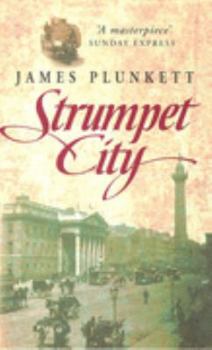Strumpet City-PB
Select Format
Select Condition 
Book Overview
Set in Dublin during the Lockout of 1913, Strumpet City is a panoramic novel of city life. It embraces a wide range of social milieux, from the miseries of the tenements to the cultivated, bourgeois... This description may be from another edition of this product.
Format:Mass Market Paperback
Language:English
ISBN:0099187507
ISBN13:9780099187509
Release Date:January 1988
Publisher:Random House (UK)
Length:576 Pages
Weight:0.68 lbs.
Customer Reviews
4 ratings
An engaging account of the Irish society in the opening decades of twentieth century
Published by Thriftbooks.com User , 18 years ago
Strumpet City by novelist James Plunkett is the entertaining Irish tale of Fitz, Fr O'Connor, Rashers Tierney, and the infamous hero of Plunket, Jim Larkin. Deftly narrating the intertwined story of these four men, Strumpet City swiftly races through the streets of Dublin in 1913 with a riveting plot characterized with an evocative theme of underlying realism, historical unionism, and the evocative difference between good and evil. Strumpet City is very strongly recommended, especially for historical fiction fans searching for an engaging (albeit fictional) account of the Irish society in the opening decades of twentieth century as illustrated through actual events, the dark side of the capitalism, and the struggling heroism of the working class.
Engaging and moving chronicle of 1915 Dublin
Published by Thriftbooks.com User , 20 years ago
Why this novel has languished when far lesser accounts of Dublin stay in print is beyond me. I read it after the recent Jamie O'Neill's "At Swim, Two Boys," and found Plunkett easier going if no less nuanced. Both authors revive a vanished Dublin, a decade or so after Bloomsday, and explore the roots of what would become the 1916 Easter Rising. While SC often is claimed to be a novelisation of the labour leader Jim Larkin and the Lockout strike that paralysed the city, JL actually appears only in a cameo of a few paragraphs. The plot's more about those who work, who must decide to keep off the job or give in due to the pressures of survival. The novel is rather lengthy, but the period it captures, by the accumulation of detail, carries you along easily. Plunkett almost never slips when letting the story continue its momentum, and his style is deceptively transparent. Particularly evocative, given the time in which Plunkett published (1969), when Irish writers were beginning to be able to publish fiction that offered a greater realism in their depictions of sexuality, is his characterisation of the tensions within liaisons. He portrays alcoholism, vagrancy, and poverty vividly, and avoids cliche in what, perhaps not at first glance, remains a well-researched and engrossing historical fiction. Perhaps Plunkett is unfairly ignored today as more of a "popular" than an intellectual Irish writer, but I urge you to seek this book out (I found mine in a Salvation Army thrift shop, but most large public libraries should have a copy) and then turn to his ambitious and often quite powerful short stories. Sure, he labors in the shadow of Joyce from a generation or two before, but he manages--at his best as here--to craft satisfying and challenging work that delves deeper into realistic presentations of his now vanished Ireland than many readers realise today. Beneath the stereotypes still marring much of what audiences expect as "true" Irish narrative, his fiction remains a reminder of the past decades now fading from living memory, and for that deserves to be rediscovered by us.
Incredible epic of the working class
Published by Thriftbooks.com User , 22 years ago
At a time in Irish history when so many novels focus on the politics of Loyalist versus nationalist, this novel deals with a much more interesting aspect - that of the haves versus the have nots. It is a rich social history of regular people and the ties that bind them. It is a beautifully interweaved story of how little events can create an incredible photograph of history and a definition of life's struggles. Few books have interested me as much - I read this book every few years to realize my good fortune and my rich heritage.
The heart of Dublin exposed in all it's glory and pain.
Published by Thriftbooks.com User , 24 years ago
Set around the great lockout when Dublin Employers set out to break the unions in 1913 strumpet city is the story of the people at the bottom of the ladder, the whores, the blue collar workers, the small people who dreamed of something more but who worked for the next few shillings to get them to the end of the week. This is Dublin when it had the largest red light district in the world, and when it was the arsehole of the Glorious British Empire over which the sun was just about to set. For anyone who has read Joyce and seen the beauty of Dublin depicted by Ulysses, they should lift the mat and see what lay underneath. This is the real novel of Dublin, meaty, raw and captivating. A loveable ould whore god bless her, a strumpet, Strumpet city!





